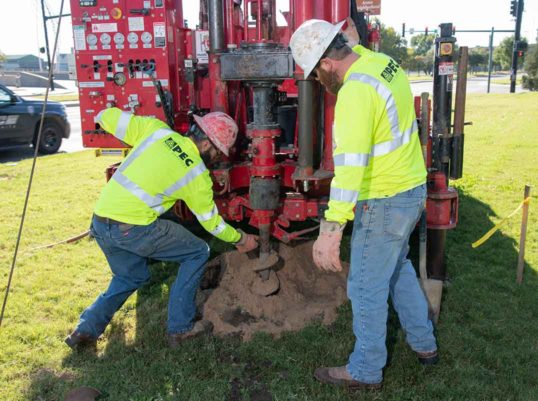The Main Principles Of Consulting Engineers
The Main Principles Of Consulting Engineers
Blog Article
Consulting Engineers - An Overview
Table of ContentsOur Consulting Engineers Diaries10 Easy Facts About Consulting Engineers Explained8 Simple Techniques For Consulting EngineersFascination About Consulting Engineers5 Simple Techniques For Consulting EngineersA Biased View of Consulting Engineers
To provide the finest experiences, we use innovations like cookies to shop and/or gain access to tool information. Consenting to these innovations will certainly permit us to process information such as surfing behavior or distinct IDs on this website.They perform site investigations, collect examples, carry out research laboratory examinations, and analyze information to assess the suitability of the ground for building and construction projects. Based on their findings, geotechnical designers give referrals for structure design, slope stability, maintaining frameworks, and mitigation of geotechnical threats. Consulting Engineers. They collaborate with various other professionals, such as engineers, structural engineers, and building teams, to make sure that geotechnical factors to consider are incorporated right into the total task layout and implementation
4 Easy Facts About Consulting Engineers Shown
They analyze the information to comprehend the properties and actions of the dirt and rock, including their strength, leaks in the structure, compaction attributes, and groundwater conditions. Geotechnical Analysis and Layout: Geotechnical designers evaluate the data accumulated throughout site examinations to examine the stability and viability of the site for construction tasks. They execute geotechnical calculations and modeling to assess factors such as birthing capability, settlement, incline stability, side earth stress, and groundwater flow.
Structure Layout: Geotechnical designers play an important function in designing structures that can securely support the designated structure. They examine the soil problems and load needs to identify the ideal foundation kind, such as shallow structures (e.g., footings), deep structures (e.g., heaps), or specialized methods like dirt improvement. They take into consideration elements such as negotiation limits, birthing capacity, and soil-structure communication to develop ideal foundation styles.
Here are some types of geotechnical designers: Foundation Engineer: Structure engineers focus on making and evaluating structures for frameworks. They assess the dirt problems, load requirements, and website characteristics to identify one of the most appropriate foundation kind and design, such as superficial structures, deep foundations, or specialized techniques like heap structures.
Get This Report about Consulting Engineers

In the office setting, geotechnical engineers utilize specialized software program tools to execute computations, produce layouts, and evaluate data. They prepare records, review job specifications, connect with clients and employee, and coordinate task activities. The workplace setting provides a favorable environment for study, analysis, and cooperation with other experts associated with the job.
They regularly go to task websites to conduct site examinations, examine geotechnical conditions, and collect data for evaluation. These sees involve traveling to various locations, often in remote or Related Site tough terrains. Geotechnical engineers may carry out dirt sampling, conduct tests, and screen building and construction tasks to guarantee that the geotechnical elements of the task are being implemented properly.
The Main Principles Of Consulting Engineers

Prior to any type of framework is built, designers need initially to evaluate it. This is to see if the ground appropriates and strong important source enough to safely start building and construction of a structure. The procedure is done with geotechnical examination. It provides details on the physical residential properties of soil earthworks for suggested frameworks and for the repair service of distress to earthworks that are caused by subsurface conditions.
Rumored Buzz on Consulting Engineers
This information can be utilized for a lot a lot more. Keep reading as we provide down the multiple functions of geotechnical investigations and why it is crucial in geotechnical engineering. Geotechnical website investigation is essential in the building procedure because it intends to understand and supply details on the site's subsurface problems.

These consist of the groundwater conditions, design problems, kinds of soils or rock, and determining the thermal resistivity of dirts. Such problems establish many elements, consisting of just how pricey the construction project will be, what kind of foundation is needed, just how the structure will be built, and so on. Despite the kind of building and construction being done, whether a residence, pipeline, or a substantial mall, a geotechnical investigation must be executed.
Consulting Engineers for Beginners
The necessary steps in carrying them out continue to be the very same. They are: This is where geotechnical engineering happens to understand the area's geology. try this out It can be done via geologic mapping, photogrammetry, or geophysical techniques. Overall, it is done to assess the physical problems of the soil.
This is commonly where they utilize borings or explorations to take out soil examples. Various other than this, the engineers will certainly also aesthetically assess the soil for rock and water.
Once engineers have performed their investigation, they will need to establish recommended remedies. Understanding subsurface conditions before the construction of the site is necessary to make certain that the framework is constructed securely and can be adequately supported.
Report this page